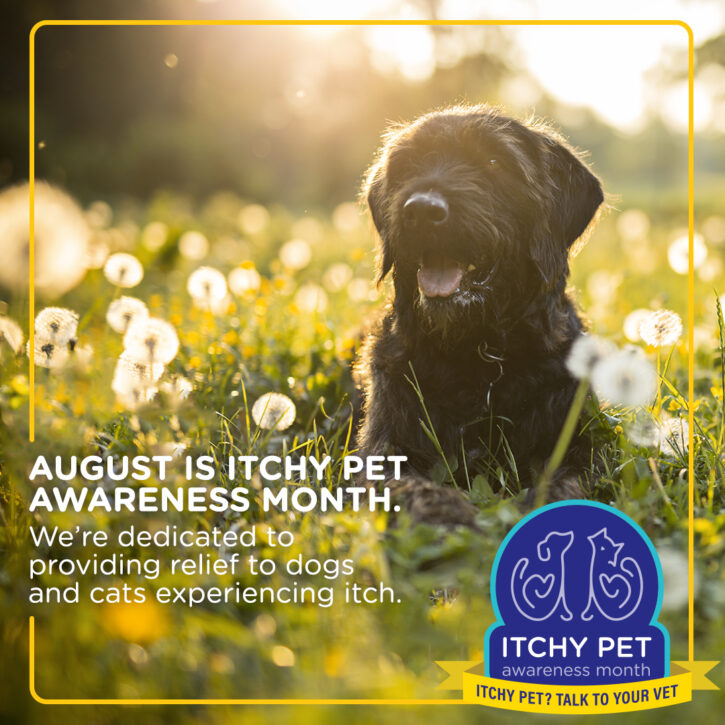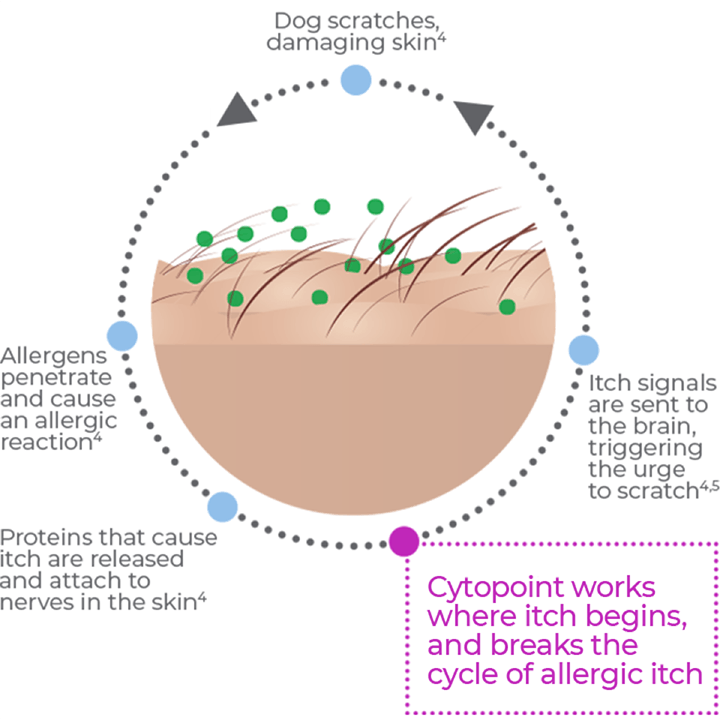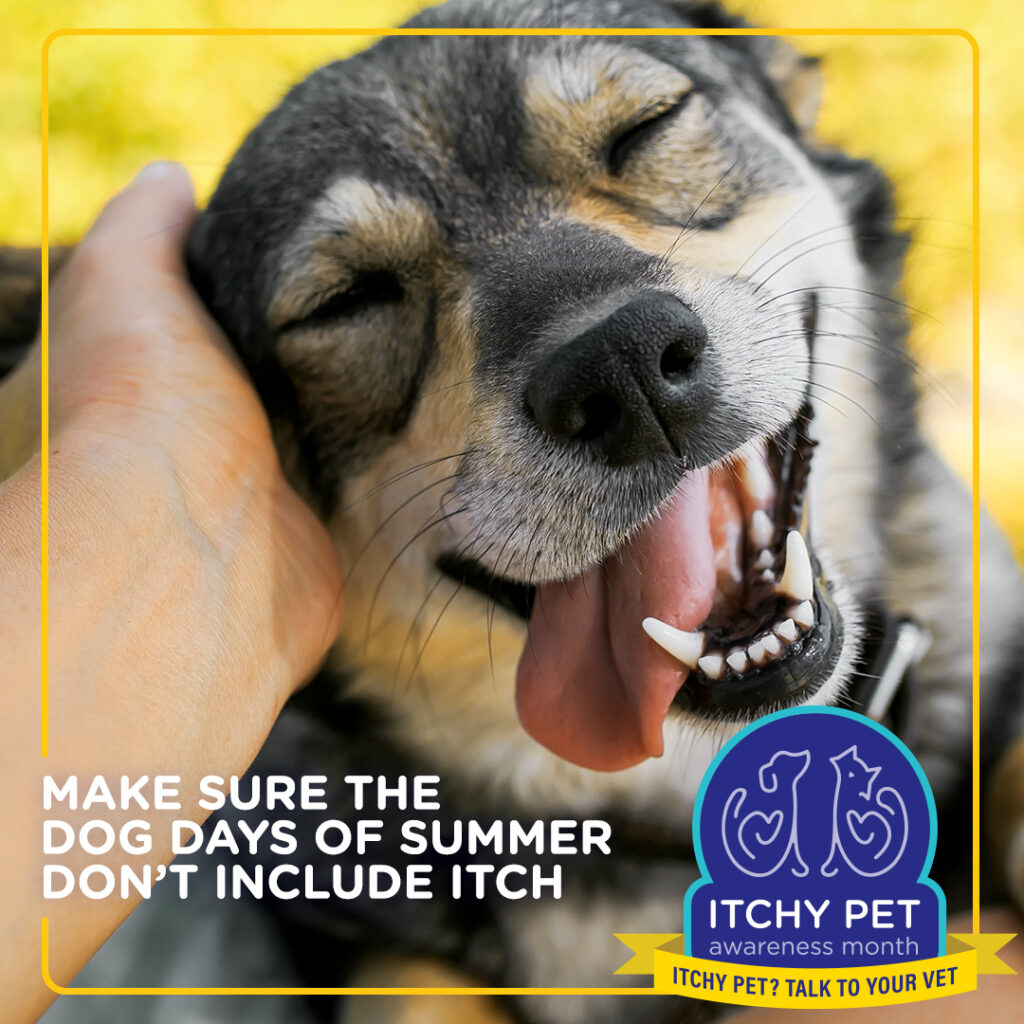
Ditch the Itch: Treatment
The most important part of treating itchiness is understanding the underlying cause of the itchiness. That is why your veterinarian will typically rule out parasites, check for skin or ear infections, and gather a thorough history of the signs at home. Once the underlying cause has been food (or other things have been ruled out), a detailed treatment plan will be developed including some of the treatments described below.
Parasiticides
If parasites like fleas or skin mites are at fault, implementing a proper parasiticide is the treatment answer. Most of the time, getting your pet on a proper flea/tick prevention will take care of all of the usual suspects. In fact, even if parasites are not officially seen, using a parasite prevention is still the first step just to make sure.
Antibiotics and Antifungal Agents
If there is a skin or ear infection present, it will likely need to be treated with the appropriate medications. Infections can be treated with oral medications, topical medications, or a combination of both.
Depending on the severity of the lesions, bacterial skin infections are typically treated with oral antibiotics; however, there are some special shampoos or creams that can be used for mild infections. Topical treatments are often preferred because there are less potential side effects and decreased risk of antibiotic resistance. Your veterinarian will determine the right combination of treatments for your pet.
Ear infections typically only require topical ear drops, but sometimes an oral medication (usually a steroid) is needed as well if there is a lot of inflammation in the ears. It is important to identify the type of ear infection (bacterial, fungal, or both) to make sure we are treating the ears appropriately. Oral antibiotics are rarely necessary for an ear infection UNLESS there is evidence of a middle or inner ear infection.
Anti-itch Medications
There are several options for anti-itch medications out there.
Antihistamines
Antihistamines like Benadryl or Claritin are very common treatments for allergies in humans; however, study after study shows they are not that effective for relieving itch in our furry companions. Some pets with mild allergies may see some relief from antihistamines, but the majority will need different medications. Your veterinarian may still offer antihistamines as an option because they are easy and quite safe, but if your pet does not experience any relief after a day or two of treatment, you should seek different treatment.
Steroids
Steroids have historically been the treatment of choice for allergies because they are fast acting (within 24 hours) and extremely effective at reducing the inflammation associated with itchiness. The downside to steroids is that they do come with more side effects:
- excessive thirst and hunger
- excessive urination
- suppression of the immune system (increasing susceptibility to some types of infections like urinary tract infections or upper respiratory infections)
- raising blood sugar that could lead to disease like Diabetes
Most of these side effects can be managed with short durations of steroids and adjusting the dose, but long-term steroid use can lead to more serious complications like Diabetes or Cushing’s Disease (hyperadrenocorticism). That is why steroids may not be a great option for treating long term itchiness due to things like allergies; however, sometimes they are the best choice. Your veterinarian can help you determine the risks and benefits to your pet.
Cyclosporine (Atopica)
Cyclosporine modulates the immune response and has been found to be useful in environmental allergies because it is useful long term and doesn’t have the side effect profile like steroids do (though it still may have some side effects of its own). The downside to this medication is it can take 4-6 weeks to become effective, so it is not useful for flare-ups of itchiness.
Apoquel (oclacitinib)
Apoquel is a relatively newer treatment for itchiness in dogs only. It works on the itch pathway to reduce the sensation of itch rather than address the inflammation in the skin. Because it inhibits a part of the itch pathway directly, it has less side effects than steroids. It starts to relieve itchiness within 4 hours, and it controls the itchiness within 24 hours! It can be used for short term and long-term relief.
Cytopoint (monoclonal antibody)
Cytopoint is a novel new treatment for dogs only that uses monoclonal antibody technology! It works like the dog’s immune system to target a specific protein in the itch pathway. It stops that protein from sending messages to the brain that triggers the itching. The other awesome thing about this medication is it is a biological medication – not a chemical! It is very safe and has few side effects associated with it.
Cytopoint is an injection that typically lasts 4-6 weeks, so this is especially beneficial in those dogs that will not take medication (no matter how well you hide it), but it is useful for any pet who is itchy.

Supplements
Omega 3 Fatty Acids
These fatty acids are helpful because they can help reduce inflammation in the skin and restore the skin barrier (which is important for itchiness related to an underlying allergy). These may not be enough to treat itchiness on their own, but they can certainly help reduce the amount of medications (like steroids) or other treatments necessary to manage itchiness. It can take some time to build up enough omega 3 fatty acids in the body to be beneficial.
There are a lot of other supplements and natural ingredients out there that can be beneficial as well (like hardy kiwi), so talk to your veterinarian about options for your pet.
Allergen-specific Immunotherapy
This is also known as “allergy shots”, and it is the preferred treatment for environmental allergies. How immunotherapy works is by hyposensitization. Essentially, the immune system is exposed to small amounts of the allergens over time so it becomes less and less reactive. Most animals can experience enough relief and improvement from their shots that they require less additional treatments; however, this is not an overnight response. It can take up to a year or more to see significant response (though many pets will experience at least some relief sooner in the process).
Even with successful immunotherapy, some pets will still need additional medications to help control flare-ups, but ideally the additional therapy will be significantly lessened.
Diet
For food allergies, diet is going to be the most important treatment. Finding or developing a proper diet will take time and a diet trial to determine what proteins your pet may be allergic to and should avoid.
If you would like to create a home cooked diet for your pet, we recommend consulting with a board-certified veterinary nutritionist to make sure the diet is formulated appropriately.
Now It’s Your Turn!
Test your knowledge with this quiz and be entered into a drawing for some awesome prizes: https://www.allcounted.com/s?did=kxnmjdf0amxnf&lang=en_US.
Resources
List of Board-certified Veterinary Nutritionists: https://acvn.org
References
Brooks, W., DVM, DABVP (2022, January 5). Allergies: Atopic Dermatitis (Airborne) in Dogs and Cats. VeterinaryPartner. Retrieved August 7, 2023, from https://veterinarypartner.vin.com/default.aspx?pid=19239&id=4951475.
Zoetis (2023). If Your Dog’s Itching Like Crazy, Ask for Apoquel. Apoquel. Retrieved August 7, 2023, from https://www.zoetispetcare.com/products/apoquel.
Zoetis (2023). Lasting Love Deserves Lasting Itch Relief. Cytopoint. Retrieved August 7, 2023, from https://www.zoetispetcare.com/products/cytopoint.

